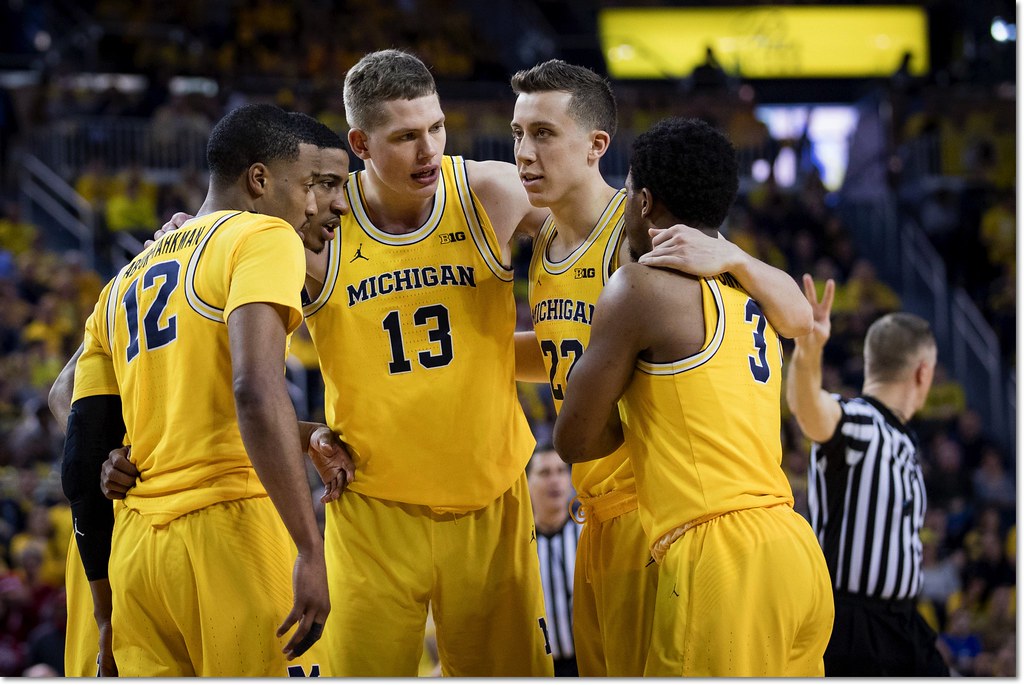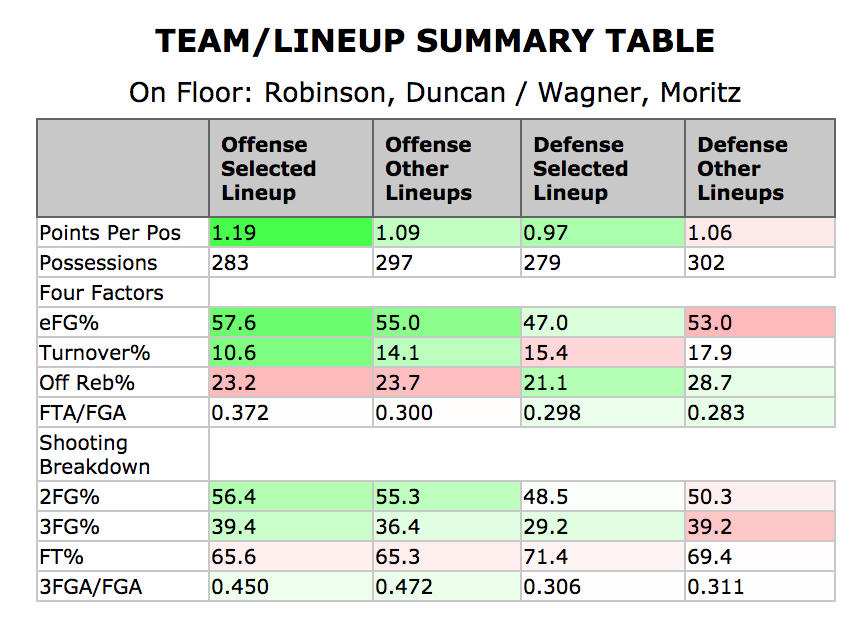john beilein has a rigid foul policy i dislike
If you missed it, here's part one of the pre-BTT mailbag, and today's podcast also featured extensive hoops discussion. Let's get right back to it.
Lineup Combos: Unlocked

Recent adjustments have given Beilein more lineup flexibility. [Marc-Gregor Campredon]
Earlier in the year a Wagner/Livers and Teske/Robinson rotation was greatly desired. Has Robinson's defensive renaissance negated the need for those substitution needs? #mgomailbag
— Austin (@Lofter4) February 27, 2018
It has indeed. When I ran a mailbag in mid-December, those lineup pairings were necessary to keep the team afloat. They aren't anymore.
While Isaiah Livers still holds the starting job, his minutes have faded significantly. Per KenPom, Duncan Robinson has played 71% of the minutes at the four over the last five games, and it's because he can be on the floor with Wagner again. Since conference play resumed, Michigan scores 1.13 points per possession and allows only 1.02 when the Robinson/Wagner combo is on the floor. The numbers get even starker when you look at the nine-game stretch since the second Purdue game, which I believe is around the time Luke Yaklich made his defensive tweak to keep Robinson mostly in the post:

via HoopLens
The defensive numbers are impacted by some three-point luck (good for Robinson/Wagner, bad for other lineups) but there are still some significant takeaways. First, the offense is lethal when Wagner and Robinson are both hitting their threes—no surprise there. The other stat that stands out to me is their ability to dominate the defensive boards. Wagner has really stepped up his game as a rebounder; Robinson doesn't go get them often, but he's done a great job of sealing off his man—usually an offensive rebounding threat—to allow Wagner and the guards/wings to swoop in and grab the ball.
So long as the impact of these defensive adjustments remain, we should continue to see Robinson play around 30 minutes per game, even if Livers continues to start. Robinson is much more impactful on offense and his hidden impact on rebounding (plus his solid post defense) has made him a more valuable defender of late than Livers. (I can't believe I just typed that.)
Luke Yaklich unlocked Michigan's best lineups. With Robinson playable on defense again, John Beilein can be comfortable putting out groups like Simpson-MAAR-Poole-Robinson-Wagner that are capable of ridiculous shooting stretches like the 51-points-in-15-minutes torching of Maryland. That's been missing from the M offense this season; it's back now.
[Hit THE JUMP for the rest of the mailbag.]

File photo [Barron]
Yes, we have to talk about it.
John Beilein is a great coach. His tenure at Michigan has left no doubt. Even great coaches, however, have their downsides. Beilein's rigidity with his foul policy qualifies, and—along with a perplexing insistence on sticking with the 1-3-1 while Maryland rained in second-half threes—it cost Michigan a shot at this game.
Muhammad-Ali Abdur-Rahkman picked up his second foul with 12:27 to go in the first half; the score was tied at nine. Zak Irvin committed his second with 6:55 to play in the half; Michigan held a 19-18 lead. Beilein went with a lineup that included walk-ons Andrew Dakich and Sean Lonergan, and didn't re-insert Rahk or Irvin until the second half.
Maryland entered halftime up 30-21 after the Wolverines scored on just one of their ten possessions after Irvin hit the bench. Using KenPom's win probability calculator, which factors in that Maryland entered the game with an 81% chance at victory, the Terrapins' win probability jumped from 78.0% to 93.3% during that span.
Although Michigan got within three during the second half, Maryland pulled away each time the Wolverines drew near, usually with an open corner three against the ineffective 1-3-1 zone. The ten-point swing with Rahk and Irvin on the bench in the first half held up as the final margin of victory.
Abdur-Rahkman finished with seven points on seven shots, seven rebounds, two assists, and three fouls in 28 minutes. Irvin had 15 points on 14 shots, three rebounds, three assists, and just the two fouls in 31. Lonergan had no points, two rebounds, and a foul in 11 minutes. Dakich had a three-pointer blocked in his three minutes.
It's not fair to Beilein to only point out the negatives. For the second consecutive game, Kam Chatman looked like a different player, scoring seven points on 3/5 shooting. Spike Albrecht tied for the team lead with 15 points. Irvin displayed a level of aggressiveness, ballhandling, and court vision that he didn't possess earlier in his career.
Beilein is coaching these guys up, and we'll undoubtedly be singing his praises again soon. Today, however, he wasn't close to his best.

Bryan Fuller/MGoBlog
It could've gone either way. Alvin Ellis drove baseline, Muhammad-Ali Adbur-Rahkman squared up, the two collided, then Ted Valentine hopped three times and called a block.
With 13:11 left in the first half, Adbur-Rahkman exited with two fouls. Michigan State led 11-8. When John Beilein reinserted him a little over eight minutes later, the Spartans held a commanding 33-14 lead.
It'd be too easy to point to that 16-point swing and say auto-benching MAAR proved the difference in the game. Michigan's problems tonight went far beyond early foul trouble for their freshman guard. No matter the defensive strategy, the Wolverines couldn't defend the paint. The Spartans finished an astonishing 25/32 on two-pointers, rebounded nine of their 19 missed shots, and turned the ball over just eight times. That's a far bigger issue than who's playing at one spot on the floor.
On this Michigan team, though, the dropoff is so severe that ceding points in the name of caution isn't an option—and, let's face it, playing Andrew Dakich instead of MAAR is handing over points to the opposition. That's twice now Beilein has benched MAAR for extended time while the Spartans pulled away. While it's unlikely Michigan would've forced overtime in this one, seeing MAAR score 12 points on seven shots in the second half—after Dakich went 0/1 with a foul in eight minutes—made it hard to imagine the strategy gave them the best shot at winning.

The story of the game on the other side was the dominance of Branden Dawson, who finished with 23 points (10/12 FG) and 13 boards. Michigan's wings couldn't handle Dawson one-on-one, but when the Wolverines went zone, Travis Trice served up lob after lob for the athletic forward to finish. Trice had an excellent night himself, scoring 22 points and dishing out seven assists; his two early threes from nearly the same spot above the break helped ignite MSU's early run. From start to finish, the Spartan offense ran smoothly and effectively.
The Wolverines, on the other hand, couldn't consistently hang. Zak Irvin needed 15 shot equivalents to score 16 points; Aubrey Dawkins needed 12 for his 12; Spike Albrecht ten for his 12. The big men were all but nonexistent; the bench, of course, depleted. On a night when Michigan's defense needed the offense to wring out every bit of talent, strategy, and luck available, they couldn't maintain that for 40 minutes.
Sometimes it's not your night. Lowrawls Nairn hit just his second three-pointer of the season early on, when Michigan sagged off of him, and it felt then like it'd be a long game. What's equally frustrating as the loss, though, is the overwhelming feeling that it could've—should've—been closer, if only Michigan approached the first half with the same urgency as the second.
52